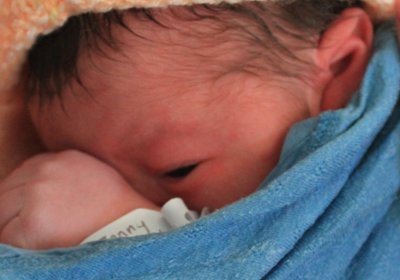 Mark Fairweather Tall reflects on the wonder of holding a newborn baby for the first time and how God knows us so intimately that we are never alone
Mark Fairweather Tall reflects on the wonder of holding a newborn baby for the first time and how God knows us so intimately that we are never alone
It was a few minutes after 4am on an overcast Monday morning in June. Light was peering in through the edges of the blind and in the distance the early morning chorus of birds could just be heard. In the room, though, all thoughts of the outside world were drowned out as a small cry emerged from the first breaths of the baby that had just been born. She was placed in her mother’s arms to be held and comforted both by touch and loving words so greatly needed as the journey from the womb to the world was completed
A little while later, she was handed to me – her proud father. Her tiny fingers grasped my little finger; one eye was shut, the other slightly open revealing a blue eye that looked like it was trying to focus on me; then, the tiniest of sneezes – an unwelcome new experience that set her off crying again. As I looked down on her and soothed her I was struck by how beautiful she was and how incredible life is. This little baby has been growing inside her mother for the previous nine months, little by little changing from an embryo of cells into a recognisable human form
Praying for her, my mind was drawn again to the words of Psalm 139: “For you created my inmost being; you knit me together in my mother’s womb. I praise you because I am fearfully and wonderfully made.” (v13-14a) The Psalmist goes on to say: “My frame was not hidden from you when I was made in the secret place. When I was woven together in the depths of the earth, your eyes saw my unformed body.” (v15-16a)
These verses emphasise the main point of this beautiful psalm that is loved by so many – the Lord knows all there is to know about me: He knows everything I do, all of my words and even my inmost thoughts; there is no where that God isn’t (He is omnipresent). The Psalmist acknowledges how wonderful this is and how precious God’s thoughts are to him. Being perfectly known could be frightening if we are aware of all our faults and view God simply as one who judges. However, when we know him as a God of love, we find our deepest human needs are met: we are known completely but we are still loved and we are never alone
Contrast this with our society where many feel that Britain is becoming an increasingly isolated place to live. We are known less and alone more. The reasons for this are many. More and more people are living on their own, due in part to the increased numbers of separated families. Greater mobility means people move around the country more and are less rooted in the community
This also has a knock on effect as families don’t live as close together as they used to, separated not just by counties but sometimes by continents as well; Advances in technology have lead to people working and shopping from home. Social networking sites mean increased levels of on-line friendships rather than meeting face to face. Games can be played in isolation on the computer rather than in person. And so we could go on... The problem is that our human needs have not changed - we still yearn to be known and loved and not alone - but our pattern of living encourages us become more individualistic and independent. The result is that more and more people are suffering from loneliness
Loneliness is often defined as being alone but perhaps it is more accurate to say that it is a state of mind. Some people enjoy solitude but loneliness causes people to feel empty, alone and unwanted. A key part of this is the feeling of rejection and the perceived lack of intimacy with anyone else. It means that you can be in a room full of people and yet feel alone. You can have a friendly chat with someone and yet doubt that they want you there. Those who feel most lonely are often the elderly, those who have been bullied and those who believe they are different
In recent decades, more research has been done into the problem of loneliness. It has been discovered that it not only affects people mentally but can impact on stress levels, heart health and the immune system. One professor who carried out research said that the health difference between a lonely person and a popular person was akin to the difference between a smoker and a non-smoker: “That stunned all of us, myself and all my colleagues in terms of the effects it had. It shows just how powerful loneliness is”
God, however, has not made us to suffer in such a way. There are things that we can understand about our identity in Christ and what that means for us that may help us to tackle issues of loneliness. Let me make some comments about this:
1) We are called to community. In the creation story God says, “It is not good for the man to be alone, I will make a helper suitable for him.” (Genesis 2:18). God has not created us to live alone but within community, both with him and other people. And that relationship with God and others is to be based on love. The challenge is that this is not natural for us. It is a part of human nature to think of ourselves first and put what is best for us as our number one priority. We probably know people who are particularly self-centred and that can grate on us, but it is a tendency we all have
We may like to rely on ourselves for providing our own needs but being in community humbles us to accept help from others. We are all imperfect human beings and being a part of a community opens us up to being hurt through the attitudes, actions or words of others. Our own imperfections are most likely to come to light when we are a part of a community and this results in us being vulnerable... People will get to know us... both the good and the bad. None of this is easy, however, we need to accept that God has made us to live in community. It is the way we have been made. It is our calling and so we must work at it
2) It helps us understand God’s love. We may have asked Jesus into our lives and we may believe in God, but how do we know that Christ really is in our hearts? How can we be sure that he isn’t a figment of our imagination? In the book of 1 John, we read, “God is love. Whoever lives in love lives in God, and God in him” (1 John 4:16b) and later, “If anyone says, ‘I love God’, yet hates his brother, he is a liar. For anyone who does not love his brother, whom he has seen, cannot love God, whom he has not seen.” (v20)
Our love for others is a sign that Christ is in us. We need to spend time with others to show our love for them – we cannot do this in isolation. Again, this is a challenge, because not everyone we meet is easy to love. It can be hard. Jesus, though, didn’t give up his love for us when it got hard. He kept on walking the path of obedience to death on the cross. It was an act of costly, perfect love. When being with others is difficult, we can identify more closely with the depth of love that Christ has for us. Being with others and loving them is our calling and so we must work at it
3) A message for society. If loneliness is a problem within our country, then the Christian has a challenge to say and show that life can be different. Building loving communities in our churches is essential. People need to have the opportunity to be known. And when they are known they need to feel accepted. And when they are known and accepted they need to feel a part of a family – God’s family. There needs to be more than a shared experience of worship on a Sunday, important though this is. Having a relationship with God as Father, Son and Holy Spirit changes us. One of the ways this happens is through being in a community with other believers
Our Christian community needs to be one where we can be known, accepted for who we are and loved. Togetherness is about sharing our journey, whether that be celebration, mourning or simple normality of day-to-day life. After all, we worship the God who journeys with us. As others see the difference community makes in our lives, it should be attractive to them and a message for our society that stands in stark contrast to that which leads to loneliness. Being examples of what it means to share in healthy relationships is our calling, and yes, we must work at it
As I look at my daughter, filled with a father’s love, I want the best for her. I want her to grow up in our family with the intimacy of being known, accepted and loved for who she is. I am getting to know her bit by bit. I know that God knows her perfectly. I hope this shapes her in the person she will be... someone who grows up with the ability to love and be loved, who understands what it means to be accepted and to accept others, and who knows the blessing of togetherness – not because it is easy but because it is God’s way
It can only happen through being with others and a part of a community. It leaves me with a challenge, not only in my family life, but also in church life... “Is there more that I could be doing to work at building loving relationships so that I myself and others are known and not alone?” Maybe it isn’t just a challenge for me, but for you as well? And if you are suffering from loneliness right now, read Psalm 139 and allow God who knows you intimately and perfectly to bring comfort and companionship to you
 Rev Mark Fairweather Tall is a Minister of Norwich Central Baptist Church, a Trustee of Norwich Foodbank and the Chair of Transforming Norwich. He blogs regularly at www.markfairweathertall.com/blog and tweets @RevMarkFT.
Rev Mark Fairweather Tall is a Minister of Norwich Central Baptist Church, a Trustee of Norwich Foodbank and the Chair of Transforming Norwich. He blogs regularly at www.markfairweathertall.com/blog and tweets @RevMarkFT.
The views carried here are those of the author, not of Network Norwich and Norfolk, and are intended to stimulate constructive debate between website users.
We welcome your thoughts and comments, posted below, upon the ideas expressed here
Click here to read our forum and comment posting guidelines